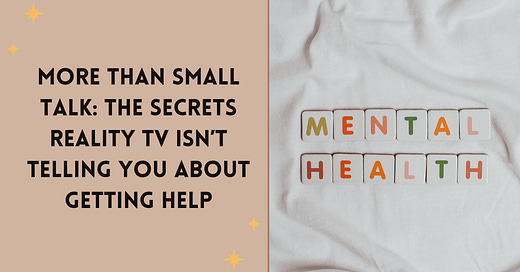Imagine this: You’re having a rough week, your mind is racing, and you think, “Maybe I should talk to someone.” But then, doubts creep in. Therapy sounds expensive, you think, and isn't it only for people with serious issues or a celebrity-sized budget?
Let’s get this straight! Therapy shouldn’t feel out of reach, and there’s a lot of misinformation out there making it seem that way. Therapy isn’t just talking; it’s about learning and growing in ways that help you build resilience, tackle life’s challenges, and find clarity. You don’t have to be rich or famous to start this journey—real therapy is accessible to everyone, including you.
Therapy in the Spotlight: Why Celebrities Aren't the Full Picture
I’m genuinely glad we’re seeing mental health in the media these days. Reality shows and social media platforms are filled with celebrities opening up about their mental health and even sharing glimpses of their therapy sessions. It’s refreshing to see the stigma around mental health start to break down.
But here’s the catch. The way therapy is sometimes portrayed—quick chats, big price tags, and instant transformations—can give the impression that therapy is a luxury for the wealthy or a trendy thing to do. This isn’t real therapy. Therapy isn’t a quick fix or an easy conversation, and it’s not just for people with big budgets. It’s a process that can benefit everyone, regardless of background or finances.
Myth 1: Therapy Is Just “Talking”
You might have heard, “Therapy is just talking about your problems.” Yes, talking is part of it, but therapy is so much more. Imagine therapy as a supportive space where you learn to tackle life’s ups and downs, communicate better, and manage emotions with practical tools. Your therapist doesn’t just listen; they guide you through deeply researched, evidence-based methods like Cognitive Behavioral Therapy (CBT), Acceptance and Commitment Therapy (ACT), or techniques from yoga psychology.
Therapy is where you develop tools for resilience, mindfulness, and self-acceptance. It’s not just a chat; it’s active work to help you approach life with clarity and strength.
Myth 2: Therapy Is Only for Anxiety or Depression
Think therapy is just for anxiety or depression? Therapy can help with those challenges, but it goes far beyond. Let’s say you want to understand yourself better, improve your relationships, or simply handle stress in a healthier way—therapy’s there for that too.
Think of it as a “mental and emotional gym.” Just like working out strengthens your body, therapy strengthens your mind and emotions. It helps you develop emotional skills and resilience, making it a powerful resource for any life stage.
Myth 3: Therapy Is Too Expensive and Only for the Wealthy
One of the biggest misconceptions is that therapy is an elite service. Sure, some high-profile therapists charge steep fees, but many qualified professionals offer sessions at a reasonable rate. In India, you can find skilled psychotherapists charging between 500 and 1,000 INR, and many even offer pro bono services for those facing financial difficulties.
Therapy doesn’t have to break the bank. And a standard session typically lasts 45 minutes to an hour—not just a quick 30-minute chat. Affordable options are out there; it’s just about finding the right fit for you.
Myth 4: Anyone Can Be a Therapist
It’s easy to think that anyone can give advice, but therapy is much more than that. Licensed therapists undergo rigorous training, often with a master’s degree in psychology or a related field, followed by ongoing certifications to stay up-to-date.
Trust and expertise are key in therapy. Make sure to look for a therapist with the right credentials to guide you through the process safely and effectively.
Myth 5: Therapy Will “Cure” You Instantly
If you’ve seen someone have a “breakthrough” on a TV show in one session, it can be tempting to think therapy is a quick fix. But real healing takes time and consistency. Most people start seeing meaningful changes after about three months. Therapy isn’t about feeling “cured” after a couple of sessions; it’s a journey that builds resilience, understanding, and long-term well-being.
Putting It All Together
So next time you catch a therapy session on reality TV, remember it’s just a tiny glimpse into a much larger, complex world. Therapy is about growth, self-discovery, and building resilience. Let’s keep the conversation going, but let’s also ensure we’re presenting it accurately, reflecting its true power.
Love and Light,
Saiyami J
PS: Ready to Explore Therapy?
If myths or misconceptions have kept you from seeking help, remember that therapy is for everyone—not just the elite. It’s perfectly okay to be curious, to ask questions, and to find out what options are available to you. Your mental health journey deserves to be more than a trend; it deserves genuine support, understanding, and, most importantly, you taking that first step.












Share this post